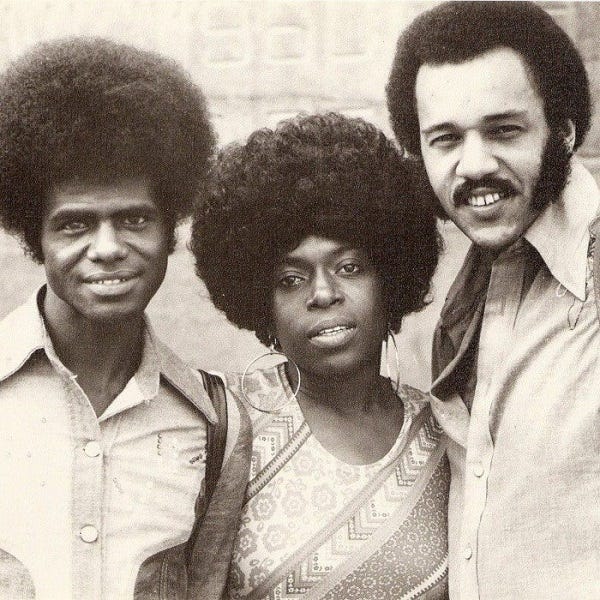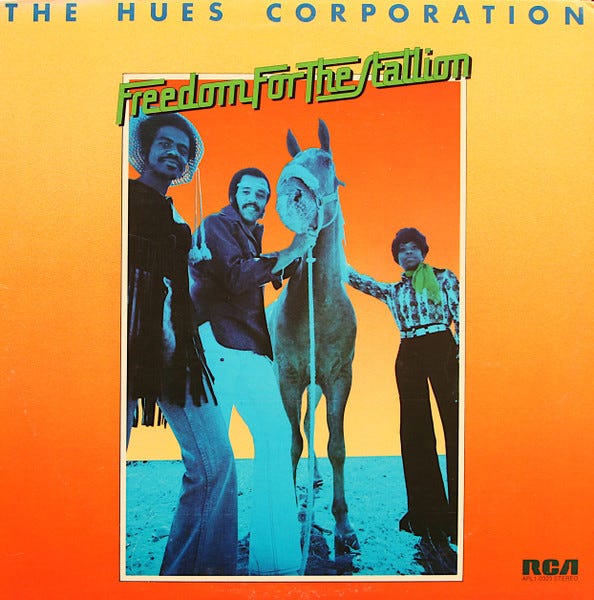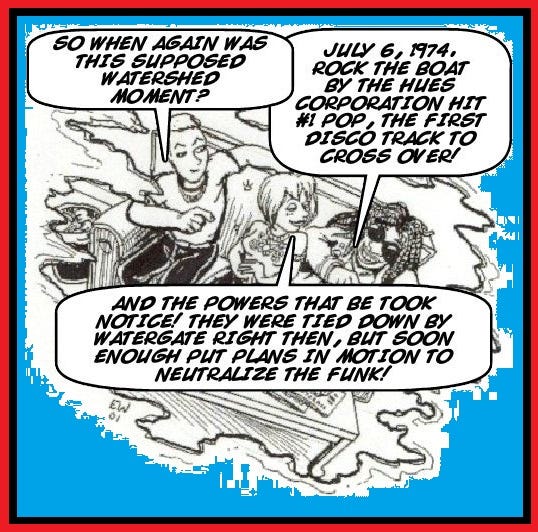St. Clair Lee (April 24, 1944 – March 8, 2011) – Freedom For The Stallion (1973)
The founding member of the Hues Corporation sang on their debut LP's beautiful title track, written by Allen Toussaint and produced by John Florez.
View most updated version of this post on Substack
Search our full archives
St. Clair Lee was the first original member of the Hues Corporation, a group he co-founded with his songwriter friend Wally Holmes in 1969.
Born in San Francisco, Bernard St. Clair Lee’s heritage was half Native American. As he shared in a late 90s interview:
“I found out that the Indian side of our family were Blackfoot and migrated down from Canada to Oklahoma and that's how I picked up wearing the headband.”
Lee was a surfer, and through his cousin befriended fellow surfer, trumpet player, and songwriter Wally Holmes in Santa Monica during the late sixties. Lee wanted to form a group, and Holmes signed on as manager. The two of them spotted singer H. Ann Kelley at a talent show in Los Angeles and brought her aboard. They found Karl Russell, the third and last of their three original vocalists, after putting up posters in L.A. area record stores. Holmes wanted to call them “The Children of Howard Hughes.” As he recalled years later:
“I knew Hughes was single and he represented a conservative element. I was kind of wild in those days and I thought a fantastic thing would be to take a Black group and call them the Children Of Howard Hughes.”
But he got a cease and desist letter from Hughes’ lawyers, and Liberty Records refused to record the group under that name. So he changed it to the Hues Corporation.
Their first single, the upbeat jam “Goodfootin’” b/w “We're Keepin' Our Business Together” was written and co-produced by Holmes, arranged by Gene Page, and released in 1970 on Liberty. It did not chart.
Two years later, Page gave the Hues Corporation their big break when he recommended them as a group that could contribute songs to the soundtrack he was composing for the legendary Blaxploitation film Blacula (1972). One was the funky, creepy cut “There He Is Again,” which they performed on screen during a nightclub scene.
Their star turn in Blacula helped get them signed to RCA Records. Former staff producer John Florez was convinced to return to the label from a higher-paying job at Bell Records in order to produce their debut album. Florez had previously produced the Friends of Distinction’s first two LP’s, and the first two masterpiece albums by a then-unknown singer/songwriter named Willie Hutch.
When he met the group, the initial track they sang for him was the Wally Holmes-penned “Rock The Boat,” which he immediately despised, considering its lyrics to be trite and lacking a deeper meaning. It almost led him to pass on the project, but he reluctantly agreed to produce the song and album on the condition that he be allowed free rein over most of its other material.
The album’s beautiful and lyrically powerful title track “Freedom For The Stallion” was written by Allen Toussaint and arranged by Page, a cover of the original by Lee Dorsey from 1971. It was released as the LP’s lead single, and while it was climbing the charts the group performed it live on the Dutch television show TopPop in early June, 1973.
Lee remembered its reception:
“When we first came out, we had a song called ‘Freedom For The Stallion’. If you could get a copy of that and listen to that song, you would see that the group had a classic going there. Nobody knew The Hues Corporation. ‘Freedom For The Stallion’ was the most beautiful song. The Black stations wouldn't play it because they said we were too white. I'm serious when I say this. The white stations wouldn't play it because they said they didn't understand what we were talking about.”
The single peaked at #63 on the Billboard Hot 100.
Another of Freedom For The Stallion’s highlights was “The Family,” co-written by the songwriting team of John Hurley and Ronnie Wilkins. They had previously written “Son of a Preacher Man,” originally intended for Aretha Franklin but first recorded by Dusty Springfield. The socially conscious cut “All Goin' Down Together” was written by Michael Jarrett, who originally recorded it in 1972, produced by Florez. The Hues Corporation’s powerful version was arranged and conducted by Page.
The LP’s superb closing cut message song “Miracle Maker (Sweet Soul Shaker)” was co-written by the great songwriters Barry Mann and Cynthia Weil. “Make me strong enough to live with all the suffering I see...strong enough to change it, if a change could ever be.”
Florez insisted that “Miracle Maker” be released as the A-side of the album’s second single, with “Rock The Boat” on the B-side. The record did not chart. Months after its release, disco DJ’s in New York City began playing “Rock The Boat,” which eventually forced influential NYC station WABC to add the song to its playlist. RCA implored Florez to remix a more dance-oriented version, and he did, boosting the bass and rhythm section.
It was re-released in mid-1974 as an A-side, with “All Goin' Down Together” on the flip. On July 6, 1974, it hit #1 on the Hot 100. Many credit it with being the first disco song to top the charts, although others point to Love Unlimited Orchestra’s “Love's Theme” or “TSOP (The Sound of Philadelphia)” by MFSB, both of which were #1 records earlier that same year.
Florez split with the group after the album’s release, since Holmes wanted them to continue “feeding the machine” by recording mindless dance tracks and giving the market what it seemed to want. None of this interested Florez.
Holmes’ plan for the group didn’t work out so well. Their mediocre follow up single “Rockin’ Soul” was written and co-produced by Holmes, but only hit #6 R&B and #18 on the Hot 100. It was all downhill from there, with none of their later songs coming anywhere close to the top of the charts.
They did record some decent tracks later in the decade, like the upbeat disco opening cut “Telegram of Love” from their 1977 I Caught Your Act LP, written and produced by Holmes. The album came out on Warner Bros. after they switched labels from RCA.
Their next LP Your Place or Mine featured the funky opening cut “Get Up Off Your Backsides,” again written and produced by Holmes.
Lee kept the group together through several lineup changes. Original member Karl Russell left in 1973, replaced by Fleming Williams who sang lead on “Rock The Boat” but himself left soon afterwards. He was replaced by Tommy Brown, then Williams came back, then left again and Russell rejoined. H. Ann Kelley departed in the late seventies, and they disbanded around 1980 after being dropped by Warner Bros.
Their final album Boogie Me, Move Me (1980) was released on the New Zealand-based label Stetson Records, where their single “I Caught Your Act” had actually hit #6 on the pop charts in 1977. At the time, it was languishing on U.S. charts at #61 R&B and #92 on the Hot 100.
In the nineties, Lee recruited new singers and again toured as the Hues Corporation. He died of natural causes at his home in 2011, gone too soon at age 66.
Rest in Power, St. Clair Lee.
Further info:
“St. Clair Lee Of the Hues Corporation,” interview by Gary James, ClassicBands.com, 1999.
"Inside the Studio: The Rise and Fall of the Hues Corporation," by John Florez, YouTube, December 13, 2016.
“St. Clair Lee born 24 April 1944,” From The Vaults, April 24, 2020.
#soul #funk #disco #JohnFlorez #WallyHolmes #HuesCorporation #StClairLee










Great read. 👍🏾🎼🎶🎼